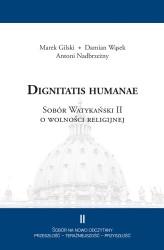Dignitatis humanae. The Second Vatican Council on Religious Freedom
Keywords:
religious freedom, Second Vatican Council, relationship between state and church, conscienceSynopsis
Dignitatis humanae. The Second Vatican Council on Religious Freedom is the second book in a series of monographs on the documents of the Second Vatican Council. The whole series aims to present the Council from the past, present, and future perspectives. It describes the documents’ historical aspect, their conciliar genesis, their linguistic specificity, their most important theological ideas, their reception and pastoral dimension, and the emerging inspirations for the future in these spaces. The book is devoted to religious freedom. It consists of five chapters and two appendices. The first part briefly overviews the idea of religious freedom before Vatican II, so for more than two thousand years of Christianity. The second part focuses on the Council’s discussions. It presents both the proposals sent to the Council by bishops, religious superiors, universities and congregations of the Roman Curia, as well as the work on the document in commissions, its schemas and the opinions expressed in the Council hall. A linguistic analysis of key Latin terms appearing in Dignitatis humanae, presented in the next section, makes it possible to discover concepts such as coercitio, immunis, and ordo publicus as specific to the Declaration on religious freedom. The fourth part is a detailed and systematic discussion of the theological ideas present in the pages of the conciliar document. The last part of the analysis is devoted to proposals for the future. The first appendix discusses religious freedom in other religions, and the second appendix presents the relationship between freedom and religious obedience. Dignitatis humanae directs attention to four areas. Firstly, the Declaration makes it possible to build a space for dialogue between the Church and the modern world, which is characterised by multiculturalism, religious and political pluralism, and an increasing democratisation of state structures. Secondly, it inspires and models the search for new theological answers to traditional questions about the nature of truth, freedom, and the components of human dignity. Thirdly, the Declaration is a modern commentary on the evangelical vision of ecclesial structures and a call for them to rid themselves of manifestations of authoritarianism and arrogance but to surround every person with care, including those on the periphery of Christianity or who are entirely outside the Church. Fourthly, this text is an excellent introduction to a proper understanding of what a worldview-neutral state consists of, which, in its concern for the well-being of all citizens, should also consider the fulfilment of their religious needs. Despite the passage of 60 years since the promulgation of Dignitatis humanae, the Declaration is not only relevant but still awaiting its full reception.



